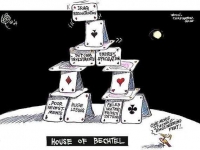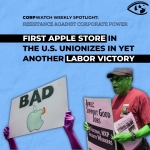The Spin Doctor Is In: Examining Corporate PR at Bechtel
In the face of criticism over its controversial construction projects, Bechtel has taken media manipulation to the next level, employing a three-pronged approach to weaving a rosy story for the public and investors.

The Bechtel Group, Inc., the massive San Francisco-based construction and engineering firm, has played a leading role in some of the most controversial construction projects in modern history: California's San Onofre nuclear reactor, Boston's budget-busting "Big Dig," the failed attempt to rebuild and privatize Bolivia's water system, the ongoing corporate takeover of the London subway system, and now a $3 billion reconstruction job in Iraq.
This week, the Associated Press revealed that Bechtel's troubles are far from over: The company has been forced to pay $110,000 to settle safety and environmental violations in recent years, and in Iraq, the subcontractors it hired have shelled out $86 million in fines. A lesser firm would be sunk by all the bad publicity, but somehow the well-connected, privately held corporation always seems to emerge unscathed and ready to score more big-ticket public works jobs.
So how does Bechtel do it?
Laura Miller, managing editor of PR Watch, a quarterly publication that tracks the public-relations industry, compares the firm's savvy media tactics to those of "the tobacco and chemical industries."
Though any corporation of Bechtel's size-it boasted $16.3 billion in revenue for 2003-works hard to control spin, Bechtel has taken media manipulation to the next level, expending vast amounts of energy trying to squelch negative press. Judging from a raft of high-level internal memos and e-mails obtained by CorpWatch , Bechtel is big on obfuscation and massaging data meant for financial institutions who lend the company money.
The documents, which include several e-mails to and from CEO Riley P. Bechtel, offer a rare insight into the strategic workings of one America's most secretive corporations. The confidential materials outline the company's response to a 4,700-word expos on the firm's disastrous dot-bomb and energy ventures that ran in the March issue of Business 2.0, a glossy San Francisco-based magazine covering the tech industry.
Business 2.0 reporters Ralph King and Charlie McCoy learned from company insiders that Bechtel's finances were in a precarious state. The firm had lost some $300 million on bad investments and had taken on a staggering debt load of $500 million, according to Bechtel documents that were leaked to the reporters. In early 2003, the reporters discovered, things were so grim that top officials considered asking executives to pony up $50 million in personal funds to keep the firm afloat.
Bechtel vigorously denied the allegations-and continues to deny them. The story was "absolutely" inaccurate, according to company spokesman Jonathan Marshall. "It portrayed the company as being in financial crisis when in fact we're in a very healthy position. The basic premise was wrong."
This isn't the first time Bechtel has aggressively challenged its critics. Last year, after The Boston Globe published a three-part series on gargantuan cost overruns on the Big Dig-a mammoth highway-tunnel project-Bechtel shot back with an 18-page response labeling the stories "a disservice to the truth" and accusing the paper of failing to grasp the basics of the construction trade. When the San Francisco Bay Guardian ran a pair of scathing stories about its water privatization ventures in 2000, Bechtel officials spammed their own staff with an e-mail faulting the weekly paper for "relying on well-worn innuendoes, falsehoods, and quotes from biased or incredible sources to round out their negative portrait."
Even before the Business 2.0 story was printed, Bechtel's pr machine was running full power. When King first contacted the firm about the money crunch late last year, company officials promptly put together a file on him, pulling together a raft of his stories, checking out the work he did for other publications, and scoping out Business 2.0. "King is a former banking reporter for The Wall Street Journal," Jock Covey, Bechtel's director of corporate and external affairs, wrote in a November 2003 memo to Riley Bechtel and other officials. "King does not have a record as a muckraker."
Bechtel also tried to "craft a response" that would convince the King and McCoy to drop their investigation. In interviews with King, Bechtel officials revealed little. A spokesperson sought to give King "a more balanced perspective," but offered no substantive information about its finances, because doing so "would require an unprecedented surrender of privacy," according to the November memo.
Covey decided to put out a canned statement claiming Bechtel was doing fine financially. "It will help persuade many if not all journalists that Bechtel is doing no worse, and possibly better, than other major industry players-thereby reducing the incentive to invest time and resources in following up the Business 2.0 story," he theorized in the memo.
While downplaying the charges to outsiders, Bechtel was actually reeling from the journalistic probe. The company, internal e-mails indicate, ran an exhaustive search of its phone and e-mail logs hoping to root out the employees who were feeding information to the reporters.
At a November 2003 meeting of company executives, Riley Bechtel directly addressed the looming exposé, and President and Chief Operating Officer Adrian Zaccaria described the upcoming story as "disturbing," adding that "we are going to suffer real, tangible harm from this story," according to a written copy of his prepared remarks.
Zaccaria's chief worry was the company's bankers, and that's where another piece of Bechtel's spin strategy came into play.
Zaccaria's comments suggest the company has a habit of showing some of its lenders only a portion of its total financial picture. "I am not worried about being able to explain or calm our key banks and customers, but I am concerned that our newer and smaller stakeholders will demand more from us," he said, according to his prepared remarks. Zaccaria added that lenders might start asking for more detailed financial statements or attach more conditions to loans made to the company.
In December, Covey came up with a solution, which he emailed to Riley Becthel and other executives: Draft a dummy financial document to assuage the doubts of lending institutions. Bechtel's finance division was ordered to prepare a "dummy for contingency use with financial institutions," the memo says. There's no indication that the document was fraudulent in any way, but the discussion in Covey's memo and other emails among top officials raises questions about Bechtel's approach to balance-sheet calculations.
Bechtel officials also planned to attack the credibility of King and McCoy, in an effort to win the pr game with its lenders. "We can take the initiative with key lenders, and perhaps others, to say that Business 2.0 is about to print a story we (and they) know to be highly misleading," Covey wrote in an internal e-mail sent in November.
Meanwhile, Deputy Chief Operating Officer Jude Laspa was tasked with "rehearsing" answers to "tough questions" from the press, correspondence shows.
Writing a story on Bechtel's PR machine involves, necessarily, interfacing directly with that apparatus. Interviewed last week, Marshall, the Bechtel spokesperson, said the firm is completely forthright with lenders. "They get extremely detailed financial information," he said.
Marshall portrayed Bechtel's PR tactics as little more than common sense. "Our approach to media relations and public affairs is straightforward: We aim to provide accurate and timely information to journalists and the public about our projects, while respecting our right to keep competitive business information and internal discussions private," he said.
Those discussions haven't always been positive . Despite Bechtel's many protestations, the company's own documents make it clear the firm was going through rough times before landing the Iraq gig and other work overseas. A "strictly confidential" December 2003 report authored by Riley Bechtel explains the company's overall net worth plummeted by $175 million in 2002, mostly due to power plant investments that soured-confirming the thrust of the Business 2.0 story.
Bechtel's business has since rebounded: In April, the company reported a major surge in revenue, thanks in part to its work in Iraq.
PR Watch's Miller isn't surprised by the company's keen interest in calming its creditors. "They don't have a product," she noted. "They don't have to worry about their image with consumers. Their concern lies primarily with investors and the financial industry."
A.C. Thompson is the writer/researcher for CorpWatch.


